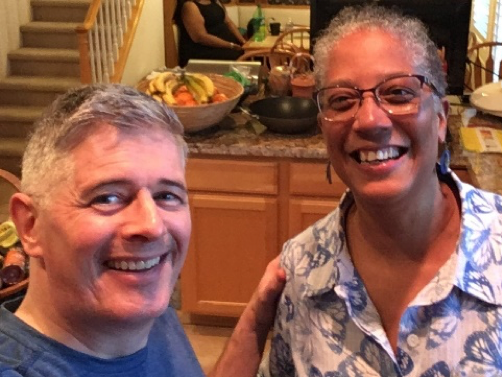
We are Audrey Jordan (evaluation consultant and executive life coach in Southern California at audreyjordan2012@gmail.com) and Tom Kelly (VP Knowledge, Evaluation & Learning at Hawai‘i Community Foundation at tkelly@hcf-hawaii.org) and we used to work together helping create local learning partnerships of evaluators and community residents in cities across the US as part of a 10-year, 10-city community systems change initiative. Local learning partnerships were intended to authentically connect community members with evaluators and data providers in working partnerships to evaluate local community change efforts and analyze data around community conditions. We believed then as we do now that evaluation must be conducted not only in partnership with communities but also that community members need the resources and capacity building to be able to engage genuinely and exercise their autonomy throughout the evaluation process.
As evaluators we are constantly working in and with communities. However, here we were intentionally working in urban communities populated mostly by people of color who not only had not had opportunities to hold decision-making power around research in their communities, many also had very negative past experiences with evaluations and external researchers who had failed in their promises to community or even exploited communities by using data to further exacerbate racist or anti-poor attitudes towards their community.
Lessons Learned:
The most important thing we learned in the success of these partnerships was the ongoing trust, communication, and relationship-building that were required between evaluators of all backgrounds even before the work of collaborative data analysis and sensemaking could begin. Each local learning partnership had to come to a shared agreement about the values and principles that would guide their work. For community members this meant defining their consensus needs and expectations more explicitly, including where their interests and concerns were different from the funder’s and evaluators’. For evaluators, this meant putting more time and resources into real relationship-building, listening, knowledge sharing, and even negotiating around issues such as budget and staffing. Ultimately, the fundamental building block of these partnerships was/is mutual respect, steeped in cultural humility by the evaluators.
Our Denver learning partnership lead the way by co-defining principles that guided the evaluation and learning to take place. Before the evaluation activities were planned and even before the community defined local strategies, they came together and defined with the evaluators their priorities and principles including that all work would contribute to human dignity, antiracism, and the equalization of power. (The full principles appear on p17 of Imagine, Act, Believe).
Cool Tip:
Other groups and communities such as the Harlem Children Zone and the San people of South Africa have also defined codes of conduct and engagement for evaluators and researchers working in their communities.
Rad Resources:
- Sustaining Neighborhood Change: The power of resident leadership, social networks, and community mobilization
- Imagine, Act, Believe: A framework for learning and results in community change initiatives
- Local Learning Partnership Guidebook
- Equitable Evaluation framework, principles and co-learning
The American Evaluation Association is celebrating Community Development TIG Week with our colleagues in the Community Development Topical Interest Group. The contributions all this week to aea365 come from our CD TIG members. Do you have questions, concerns, kudos, or content to extend this aea365 contribution? Please add them in the comments section for this post on the aea365 webpage so that we may enrich our community of practice. Would you like to submit an aea365 Tip? Please send a note of interest to aea365@eval.org. aea365 is sponsored by the American Evaluation Association and provides a Tip-a-Day by and for evaluators.
